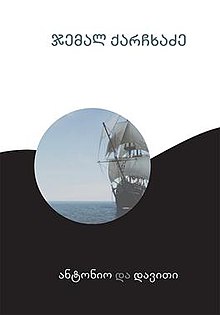Antonio and David
 | |
| Author | Jemal Karchkhadze |
|---|---|
| Language | Georgian |
| Genre | Novel Philosophical fiction Historical fiction |
Publication date | 1987 |
| Publication place | Georgia |
| Pages | 134 pages |
Antonio and David is a novel by a Georgian postmodern writer Jemal Karchkhadze. Published in 1987. It has been translated and published in many countries, including in Sweden, Egypt and Norway and is one of Karchkhadze's most popular works in Georgia. The novel centers around the control of a man's soul against a backdrop of poverty in medieval Georgia. [1]
About the book
The book takes place in medieval Georgia.The book is narrated by an Italian traveler who visits the country with a group of European missionaries. Antonio and David is a strained drama, which describes a struggle of soul, on the background of religious and historical discourse. The book is a masterpiece of a powerful Georgian writer.
Plot
The book is narrated by an Italian traveller, who visits the country with a group of European missionaries. The traveller eventually became involved in a drama occurring in a small village on top of a mountain.
In 1600 AD, in a remote Italian city, a young peddler named Bartolomeo d'Aniti is called to the court and ordered to accompany a delegation to the distant land of Georgia, which is referred to as Colchis in the novel. At that time, Bartolomeo was accused of betrayal of Pope and was considered as a Heretic, but at last he is forgiven and sent to a journey with priests.
During the voyage he meets Antonio, a former priest accused of worshipping the Devil. In the course of the voyage, they become good friends. However, this friendship with the fallen priest soon draws Bartolomeo into a web of intrigue in the foreign country of Georgia. After a long journey, they reach the bank of Samegrelo, where they are sheltered by a chief.
Antonio and Bartolomeo decide to medically treat population. After a while, by an order, they leave Samegrelo and reach Imereti. They study Georgian flora, fauna and traditions. Once, they meet a stronghold and at its gates, a black slave. Travellers try to communicate, but in vain. Then, a peasant tells them story of the stronghold. Once upon a time, there lived a prince, who had a sexual contact with his servant and decided to get rid of a baby. The baby was named David and was sold in Istanbul, but he got free very soon and returned to his motherland, where he brought Turkish people and started to trade with children.
Local nobleman, who had married his half-sister, was threaten by David, to not to spread his secret and David, himself, sheltered in prison. After hearing this, Antonio got enraged and decided to catch David. Although Bartolomeo prevented him. He thought it wasn't foreigners' affair. When David appeared in town, Antonio tried to derange his politics, but couldn't. For this, town was fined with 3 hostages, including 2 young man and a local priest. On the second day, Antonio went to David's stronghold and offered big amount of gold for hostages. Chief of the stronghold accepted, but with only one condition: they wouldn't ever return. David freed his hostages immediately and returned their gold, because for him, it didn't cost anything.
Since then, locals changed their minds about foreigners. On the second day, Bartolomeo heard about events and went to Antonio. Antonio was returning and They met on the road. Antonio narrated everything to him. He said that he had dreamt a prophecy and because of that, he went to David, and David undergoes a transformation caused by the spiritual influence of Antonio. David repented his sins and by an order of foreigners, he read the Holy Book. By an advice of travellers, he expended his money on returning sold slaves, but he couldn't rescue all of them and grieve visited him. He started to pray. After seeing this, enraged people decided to pelt him.
Antonio and Bartolomeo heard about it from a David's slave, called Bebe and rescued ex-robber. Nobleman of town reported them to the chief. After a while, chief's retinue arrived at traveller's place. They accused Antonio for sheltering a robber. They made a demand: he must have poisoned himself or got burned in Italy. Antonio choose second and he had been captured by the Holy Inquisition back in his own country.
The author uses a narration style that incorporates Georgian ways of life from a foreigner's point of view. The novel is presented against a backdrop of snow-capped mountains, lush valleys, dense forests, the Black Sea, slave traders, bandits, bounty hunters, noble princes, priests and "false counts."[2]
Characters
- Merchant Bartolomeo d'Aniti - narrator, Italian traveller and tradesman.
- Antonio - Bartolomeo's companion monk, traduced as a Heretic.
- David - natural child, sold at Istanbul bazaar, but soon returned as a brigand.
- Efrem - local, impudent priest. Initiator of David's pelting.
- Father Sebastiane - priest, overseer of the journey.
- Bebe - David's black slave, brought from Istanbul.
Responses
in 2014, Ministry of Culture and Monument Protection of Georgia supported Jemal Karchkhadze's novel "Antonio and David", to be translated into Arabian. It was published by Al Kotob for Publishing & Distribution. This project was materialized by "Georgian Literature's Promoting Program". In this project, the book was also translated into Swedish. Except this, the novel was already in Chech and Turkish languages.
External links
Sources
- ანტონიო და დავითი
- https://www.amazon.co.uk/Antonio-och-David-Jemal-Karchkhadze/dp/9185191825/277-5340110-2461757?ie=UTF8&*Version*=1&*entries*=0
References
- ^ Antonio och David av Jemal Karchkhadze | Ruin
- ^ agenda.ge
